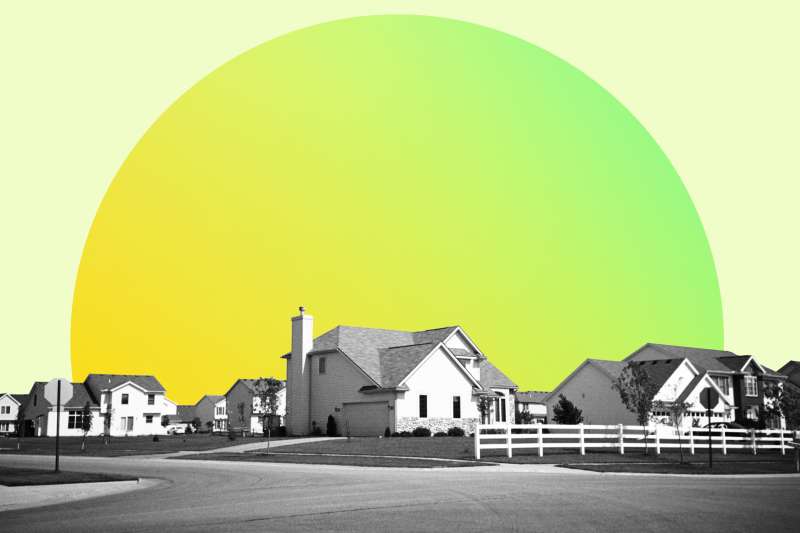Current Mortgage Rates Jump Up to 6.5%

If you're struggling to afford a home, the challenge got a little harder this week, thanks to another big jump in mortgage rates. After trending lower during the month of January, rates have risen for three straight weeks. They're now at their highest level since the first week of January.
The average rate on a 30-year fixed-rate mortgage rose to 6.50%, according to Freddie Mac; that's an increase of 0.18 percentage points from a week ago. Together, the three consecutive weeks of hikes have raised the 30-year rate by a total of 0.41 percentage points.
The average rate on a 15-year fixed-rate loan also jumped this week, increasing by 0.25 percentage points to 5.76%.
The rise in rates over the past three weeks has dampened January's budding signs of a housing market revival, and more hardship may be ahead. Market expectations are now for mortgage rates to continue their upward trend for the next few weeks. It's considered unlikely, though, that the 30-year rate will surpass 7% within that time frame.
Would-be homebuyers are responding to the trend. The number of borrowers applying for some type of mortgage decreased for the third week in a row, according to the Mortgage Bankers Association, dropping a hefty 13% during the week of the 11th to the 17th of February.
Purchase applications alone were down by a seasonally adjusted 18% during the same week. Compared to last year, the number of potential homebuyers applying for a home loan was down by a whopping 41%.
"The increase in mortgage rates has put many homebuyers back on the sidelines once again," said Joel Kan, vice president and deputy chief economist for the MBA, in a press release. That's especially the case, he adds, "for first-time homebuyers who are the most sensitive to affordability challenges and the impact of higher rates."
For those who must buy this year because of life changes — a new job, marriage or divorce, or kids — there is a glimmer of hope. Home price growth is slowing, and in several cities, prices are even forecast to fall by double-digits this year, which promises a bit of a break in the cost of homeownership.
If you are offered a rate that is higher than you expect, make sure to ask why, and compare offers from multiple lenders. (Money's list of the Best Mortgage Lenders is a good place to start. Homeowners considering a mortgage refinance should consider our list of the Best Mortgage Refinance Companies.)
Mortgage interest rates for the week ending February 23, 2023
Mortgage rate trends
Mortgage rates increased this week —
- The current rate for a 30-year fixed-rate mortgage is 6.50%, up by 0.18 percentage points from a week ago. The 30-year rate averaged 3.89% a year ago this week.
- The current rate for a 15-year fixed-rate mortgage is 5.76%, increasing by 0.25 percentage points over the past seven days. Last year, the 15-year rate averaged 3.14%.
For its weekly rate analysis, Freddie Mac looks at rates offered for the week ending each Thursday. The average rate represents roughly the rate a borrower with strong credit and a 20% down payment can expect to see when applying for a mortgage right now. Borrowers with lower credit scores will generally be offered higher rates.
Money's average mortgage rates for February 23, 2023
Mortgage rates were mixed yesterday. Borrowers looking into a 30-year fixed-rate loan found rates averaging 7.442%, 0.174 percentage points lower than Tuesday. On the other hand, the rate for a 15-year fixed-rate mortgage increased by 0.076 percentage points to 6.507%.
- The latest rate on a 30-year fixed-rate mortgage is 7.442%. ⇓
- The latest rate on a 15-year fixed-rate mortgage is 6.507%. ⇑
- The latest rate on a 5/6 ARM is 7.306%. ⇓
- The latest rate on a 7/6 ARM is 7.416%. ⇓
- The latest rate on a 10/6 ARM is 7.479%. ⇑
Today’s mortgage rates and your monthly payment
The rate on your mortgage can make a big difference in how much home you can afford and the size of your monthly payments.
If you bought a $250,000 home and made a 20% down payment — $50,000 — you would end up with a starting loan balance of $200,000. On a $200,000 home loan with a fixed rate for 30 years:
- At 3% interest rate = $843 in monthly payments (not including taxes, insurance, or HOA fees)
- At 4% interest rate = $955 in monthly payments (not including taxes, insurance, or HOA fees)
- At 6% interest rate = $1,199 in monthly payments (not including taxes, insurance, or HOA fees)
- At 8% interest rate = $1,468 in monthly payments (not including taxes, insurance, or HOA fees)
You can experiment with a mortgage calculator to find out how much a lower rate or other changes could impact what you pay. A home affordability calculator can also give you an estimate of the maximum loan amount you may qualify for based on your income, debt-to-income ratio, mortgage interest rate and other variables.
Other factors that determine how much you'll pay each month include:
Loan Term:
Choosing a 15-year mortgage instead of a 30-year mortgage will increase monthly mortgage payments but reduce the amount of interest paid throughout the life of the loan.
Fixed vs. ARM:
The mortgage rates on adjustable-rate mortgages reset regularly (after an introductory period) and monthly payments change with it. With a fixed-rate loan payments remain the same throughout the life of the loan.
Taxes, HOA Fees, Insurance:
Homeowners' insurance premiums, property taxes and homeowners association fees are often bundled into your monthly mortgage payment. Check with your real estate agent to get an estimate of these costs.
Mortgage Insurance:
Mortgage insurance costs up to 1% of your home loan's value per year. Borrowers with conventional loans can avoid private mortgage insurance by making a 20% down payment or reaching 20% home equity. FHA borrowers pay a mortgage insurance premium throughout the life of the loan.
Closing Costs:
Some buyers finance their new home's closing costs into the loan, which adds to the debt and increases monthly payments. Closing costs generally run between 2% and 5% and the sale prices.
How are mortgage rates impacting home sales?
The chill in the housing market continued in January, with home sales decreasing for the 12th consecutive month.
Existing home sales -- including those for single-family residences, condos, townhomes and co-ops -- dipped by 0.7% between December 2022 and January 2023. With that dip, a seasonally adjusted annual total of 4 million homes were sold during that period, according to the National Association of Realtors. That's the lowest rate of sales in over ten years.
The rapid rise in mortgage rates has slammed the brakes on a housing market that was speeding along at a breakneck pace. Compared to the rate set in January 2022, sales in 2023 are down by nearly 37%.
The slowdown in demand has led to a slight improvement in the number of houses on the market. Still, the available inventory represents only a supply for 2.9 months at the current pace of sale. That's well below the six-months supply that's considered to be 'normal.'
That said, buyers have more leverage than they once did, says Lawrence Yun, chief economist at NAR, especially for properties that have languished on the market for a while. "[B]uyers are beginning to have better negotiating power," Yun says. "Homes sitting on the market for more than 60 days can be purchased for around 10% less than the original list price."
Current Mortgage Rates Guide
Should I lock in my mortgage rate today?
Locking in a rate as soon as you have an accepted offer on a house (and find a rate you’re comfortable with) can help guarantee a competitive rate and affordable monthly payments on your home mortgage. A rate lock means that your lender will guarantee you an agreed-upon rate for typically 45 to 60 days, regardless of what happens with average rates. Locking in a competitive rate can protect the borrower from rising interest rates before closing on the mortgage
It may be tempting to wait to see if interest rates will drop lower before getting a mortgage rate lock, but this may not be necessary. Ask your lender about “float-down” options, which allow you to snag a lower rate if the market changes during your lock period. These usually cost a few hundred dollars.
What are points on a mortgage?
Discount points are a way for borrowers to reduce the interest rate they will pay on a mortgage. By buying points, you’re basically prepaying some of the interest the bank charges on the loan. In return for prepaying, you get a lower interest rate which can lead to a lower monthly payment and savings on the overall cost of the loan over its full term.
A mortgage discount point normally costs 1% of your loan amount and could shave up to 0.25 percentage points off your interest rate. (So, with a $200,000 mortgage loan, a point would cost $2,000.) The exact reduction varies by lender. Always check with the lender to see how much of a reduction each point will make.
Discount points only pay off if you keep the home long enough. Selling the home or refinancing the mortgage before you break even would short-circuit the discount point strategy.
In some cases, it makes more sense to put extra cash toward your down payment instead of discount points if a larger down payment could help you avoid paying PMI premiums, for example.
What is a good interest rate on a mortgage?
A good mortgage rate is one where you can comfortably afford the monthly payments and where the other loan details fit your needs. Consider details such as the loan type (i.e. whether the rate is fixed or adjustable), length of the loan, origination fees and other costs.
That said, today's mortgage rates are near historic lows. Freddie Mac's average rates show what a borrower with a 20% down payment and a strong credit score might be able to get if they were to speak to a lender this week. If you are making a smaller down payment, have a lower credit score or are taking out a non-conforming (or jumbo loan) mortgage, you may see a higher rate. Money’s daily mortgage rate data shows borrowers with 700 credit scores are finding rates around 6.5% right now.
What credit score do mortgage lenders use?
Most mortgage lenders use your FICO score — a credit score created by the Fair Isaac Corporation — to determine your loan eligibility.
Lenders will request a merged credit report that combines information from all three of the major credit reporting bureaus — Experian, Transunion and Equifax. This report will also contain your FICO score as reported by each credit agency.
Each credit bureau will have a different FICO score and your lender will typically use the middle score when evaluating your creditworthiness. If you are applying for a mortgage with a partner, the lender can base their decision on the average credit score of both borrowers.
Lenders may also use a more thorough residential mortgage credit report that includes more detailed information that won’t appear in your standard reports, such as employment history and current salary.
What is the difference between the interest rate and APR on a mortgage?
Borrowers often mix up interest rates and annual percentage rates (APR). That’s understandable since both rates refer to how much you’ll pay for the loan. While similar in nature, the terms are not synonymous.
An interest rate is what a lender will charge on the principal amount being borrowed. Think of it as the basic cost of borrowing money for a home purchase.
An APR represents the total cost of borrowing money and includes the interest rate plus any fees, associated with generating the loan. The APR will always be higher than the interest rate.
For example, a $300,000 loan with a 3.1% interest rate and $2,100 worth of fees would have an APR of 3.169%.
When comparing rates from different lenders, look at both the APR and the interest rate. The APR will represent the true cost over the full term of the loan, but you’ll also need to consider what you’re able to pay upfront versus over time.
How are mortgage rates set?
Lenders use a number of factors to set rates each day. Every lender's formula will be a little different but will factor in the current federal funds rate (a short-term rate set by the Federal Reserve), competitor rates and even how much staff they have available to underwrite loans. Your individual qualifications will also impact the rate you are offered.
In general, rates track the yields on the 10-year Treasury note. Average mortgage rates are usually about 1.8 percentage points higher than the yield on the 10-year note.
Yields matter because lenders don't keep the mortgage they originate on their books for long. Instead, in order to free up money to keep originating more loans, lenders sell their mortgages to entities like Freddie Mac and Fannie Mae. These mortgages are then packaged into what are called mortgage-backed securities and sold to investors. Investors will only buy if they can earn a bit more than they can on the government notes.
How do I get the best mortgage rate?
Shopping around for the best mortgage rate can mean a lower rate and big savings. On average, borrowers who get a rate quote from one additional lender save $1,500 over the life of the loan, according to Freddie Mac. That number goes up to $3,000 if you get five quotes.
The best mortgage lender for you will be the one that can give you the lowest rate and the terms you want. Your local bank or credit union is one place to look. Online lenders have expanded their market share over the past decade and promise to get you pre-approved within minutes.
Shop around to compare rates and terms, and make sure your lender has the type of mortgage you need. Not all lenders write FHA loans, USDA-backed mortgages or VA loans, for example. If you're not sure about a lender's credentials, ask for its NMLS number and search for online reviews.
Why is my mortgage rate higher than average?
Not all applicants will receive the very best rates when taking out a new mortgage or refinancing. Credit scores, loan terms, interest rate types (fixed or adjustable), down payment size, home location and loan size will all affect mortgage rates offered to individual home shoppers.
Rates also vary between mortgage lenders. It's estimated that about half of all buyers only look at one lender, primarily because they tend to trust referrals from their real estate agent. Yet this means that they may miss out on a lower rate elsewhere.
Freddie Mac estimates that buyers who got offers from five different lenders averaged 0.17 percentage points lower on their interest rate than those who didn't get multiple quotes. If you want to find the best rate and term for your loan, it makes sense to shop around first.
Should you refinance your mortgage when interest rates drop?
Determining whether it's the right time to refinance your home loan or not involves a number of factors. Most experts agree you should consider a mortgage refinance if your current mortgage rate exceeds today's mortgage rates by 0.75 percentage points. Some say a refi can make sense if you can reduce your mortgage rate by as little as 0.5 percentage points (for example from 3.5% to 3%). It doesn't make sense to refinance every time rates decline a little bit because mortgage fees would cut into your savings.
Many of the best mortgage refinance lenders can give you free rate quotes to help you decide whether the money you'd save in interest justifies the cost of a new loan. Try to get a quote with a soft credit check which won't hurt your credit score.
You could increase interest savings by going with a shorter loan term such as a 15-year mortgage. Your payments will be higher, but you could save on interest charges over time, and you'd pay off your house sooner.
How much does the interest rate affect mortgage payments?
In general, the lower the interest rate the lower your monthly payments will be. For example:
- If you have a $300,000 fixed-rate 30-year mortgage at 4% interest, your monthly payment will be $1,432 (not including property taxes and insurance). You'll pay a total of $215,608 in interest over the full loan term.
- The same-sized loan at 3% interest will have a monthly payment of $1,264. You will pay a total of $155,040 in interest — a savings of over $60,000.
You can use a mortgage calculator to determine how different mortgage rates and down payments will affect your monthly payment. Consider steps for improving your credit score in order to qualify for a better rate.
Summary of current mortgage rates
Mortgage rates increased this week —
- The current rate for a 30-year fixed-rate mortgage is 6.50%, up by 0.18 percentage points from a week ago. The 30-year rate averaged 3.89% a year ago this week.
- The current rate for a 15-year fixed-rate mortgage is 5.76%, increasing by 0.25 percentage points over the past seven days. Last year, the 15-year rate averaged 3.14%.






